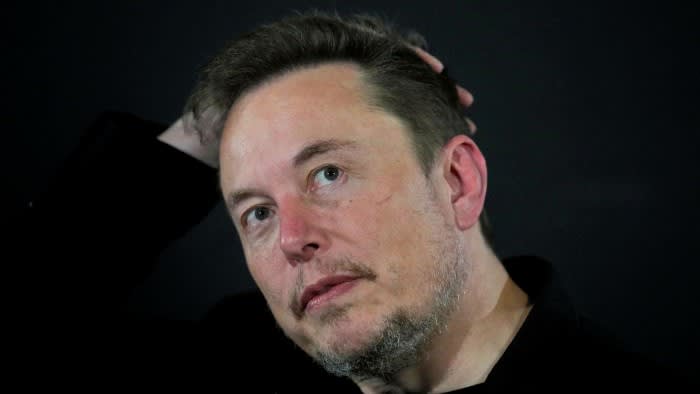Stay informed with free updates
Simply sign up to the Artificial intelligence myFT Digest — delivered directly to your inbox.
The capability of new artificial intelligence models will surpass human intelligence by the end of next year, so long as the supply of electricity and hardware can satisfy the demands of the increasingly powerful technology, according to Elon Musk.
“My guess is that we’ll have AI that is smarter than any one human probably around the end of next year,” said the billionaire entrepreneur, who runs Tesla, X and SpaceX. Within the next five years, the capabilities of AI will probably exceed that of all humans, Musk predicted on Monday during an interview on X with Nicolai Tangen, the chief executive of Norges Bank Investment Management.
Musk has been consistently bullish on the development of so-called artificial general intelligence, AI tools so powerful they can beat the most capable individuals in any domain. But Monday’s prediction is ahead of schedules he and others have previously forecast. Last year, he predicted “full” AGI would be achieved by 2029. Some of Musk’s boldest predictions, such as rolling out self-driving Teslas and landing a rocket on Mars, have not yet been fulfilled.
A number of AI breakthroughs over the past 18 months, including the launch of video generation tools and more capable chatbots, have pushed the frontier of AI forward faster than expected. Demis Hassabis, the co-founder of Google’s DeepMind, predicted earlier this year that AGI could be achieved by 2030.
The pace of development has been slowed by a bottleneck in the supply of microchips, particularly those produced by Nvidia, which are essential for training and running AI models. Those constraints were easing, Musk said, but new models are now testing other data centre equipment and the electricity grid.
“Last year it was chip constrained . . . people could not get enough Nvidia chips. This year it’s transitioning to a voltage transformer supply. In a year or two [the constraint is] just electricity supply,” he said.
Musk’s eagerness to join the AI race runs counter to the high-profile stance he took last year calling for a pause in advanced AI development. He warned of the “profound risks to society and humanity” posed by super-powerful AI tools and called for an immediate pause on training any system more powerful than OpenAI’s GPT-4, the market leading model.
On Monday, Musk said his own AI start-up, xAI, was training a second version of its model Grok “which we think should be better than GPT-4”. That should be complete by May and would be followed by a new model orders of magnitude more powerful, he added.
Musk has shifted more time and resources to xAI over the past year. He is attempting to raise billions of dollars from investors in the US, Middle East and Hong Kong in order to compete with OpenAI, in a funding round which would value the company at $18bn, according to people with knowledge of that process.
Musk has played a central, and often contentious, role in the development of new AI tools over the past decade.
He was a co-founder of OpenAI in 2015 but left the company in 2018 after falling out with chief executive and co-founder Sam Altman over the direction of research.
Musk sued OpenAI and Altman for breach of contract in March, alleging they had compromised the start-up’s stated mission of building AI for the benefit of humanity — a claim OpenAI has strongly denied.
